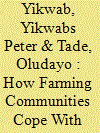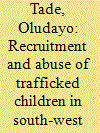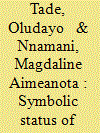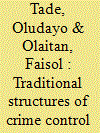| Srl | Item |
| 1 |
ID:
185139


|
|
|
|
|
| Summary/Abstract |
A largely overlooked area in extant literature on farmer-herder conflict in Nigeria is coping strategies employed by internally displaced farming communities. Using exploratory design and qualitative data collection tools, we collected data from 23 purposively selected victims of farmer-herder conflict in Nasarawa State who were displaced and were either living in internally displaced persons camps or with friends/family. Findings showed that participants relied on their friends and family to cope with victimization experiences. Reported coping strategies included job switching, relocation to a safer place, formation of a vigilance group and trusting in God. The article recommends, among other things, empowering displaced populations with skills to cope with displacement challenges.
|
|
|
|
|
|
|
|
|
|
|
|
|
|
|
|
| 2 |
ID:
134353


|
|
|
|
|
| Summary/Abstract |
This article examines the recruitment and transportation of internally trafficked children from Benue State in the north-central geo-political zone of Nigeria to Oyo State in the south-western zone of Nigeria. The study is essentially qualitative: with the aid of the snowball sampling technique, in-depth interviews (IDIs) were conducted with drivers, employers and trafficking agents in two recipient communities in Ibadan. The findings show that human rights abuses manifest at the recruitment, transportation and destination phases. The human rights abuses include the recruitment of underage children for domestic work outside their immediate family environments; transportation under inhumane conditions; restriction of movement at traffickers' ‘warehouses’; non-disclosure of amount payable for the services of domestic servants by agents/traffickers; exclusion of domestic servants in wage negotiations; and violence by employers. In view of these, there is a need for the National Agency for the Prohibition of Trafficking in Persons to strengthen its internal trafficking campaign.
|
|
|
|
|
|
|
|
|
|
|
|
|
|
|
|
| 3 |
ID:
153650


|
|
|
|
|
| Summary/Abstract |
Traditional and social dimensions of wedding celebrations have been altered by modernity. Such alteration is apparent in the emerging culture of conducting wedding ceremonies in event centres as against the use of traditional family social space. This paper investigates the reasons underlying this emerging culture and its symbolism. Findings indicate that conducting marriages in event centres eased stresses associated with celebration. Convenience, accessibility, proximity, and cost influenced the choice of event centres used by celebrants. Event centres are categorised as big, medium and small relative to cost and facilities present. Hence, patronage of any of these leads to social categorisation and delineation of the users as ‘rich’ and ‘poor’, and confers high valuation on the users and the event.
|
|
|
|
|
|
|
|
|
|
|
|
|
|
|
|
| 4 |
ID:
139488


|
|
|
|
|
| Summary/Abstract |
Notwithstanding the embrace of modern institutions of social control, traditional social control mechanisms still enjoy patronage in Nigeria. This paper examines the traditional structures of social control in Iraye-Oke, Lagos. In-depth interviews, key informant interviews and case studies were used to obtain data from participants. Findings established the functionality of traditional structures in checking crime and its preference over the use of modern social control structures. Traditional structures used include: traditional spiritualists who provide measures to reduce victimisation; the family courts where adjudication takes place involving elders and family chiefs; and the apex traditional court, presided over by the king, where cases like murder, land disputes, adultery and fornication are decided. Traditional extrajudicial measures involve the invocation of ancestral spirits at shrines.
|
|
|
|
|
|
|
|
|
|
|
|
|
|
|
|